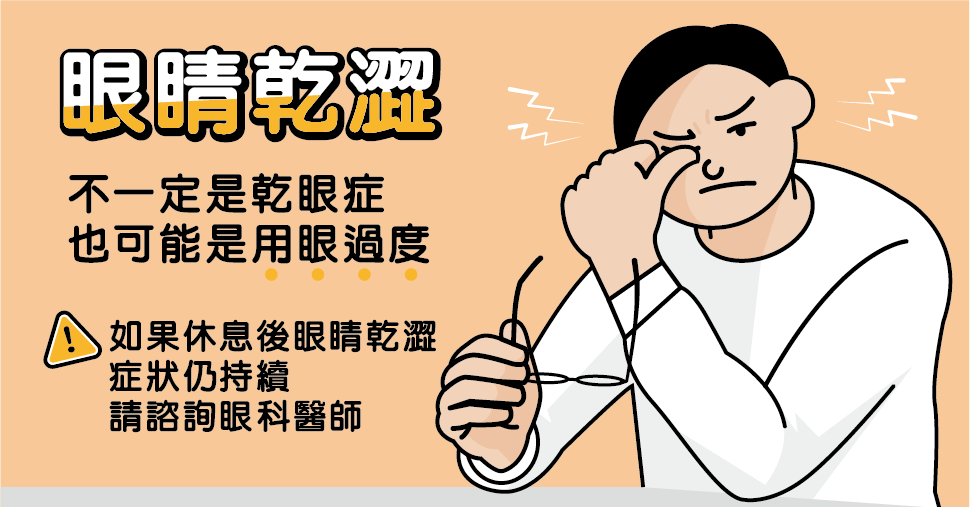Menu
Others
Issue 513 – Dealing with Dry, Irritated Eyes? TFDA Explains Dry Eye Syndrome
Spending long hours in front of the computer, staying up late binge-watching shows, and constantly using your phone have become a norm in modern life. When you experience symptoms such as eye dryness, redness, itching, blurred vision, burning sensations, or pain that do not improve after resting, you may be suffering from dry eye syndrome.
According to the Taiwan Food and Drug Administration (TFDA), dry eye syndrome refers to a condition in which the eyes produce insufficient tears, tears are unevenly distributed, or tears evaporate too quickly, resulting in the eye surface being unable to stay properly moisturized. Eye dryness does not always indicate dry eye syndrome—it may simply be a sign of eye strain. However, if the dryness persists after rest and is accompanied by symptoms like redness, itching, burning, pain, or blurred vision, you should consult a professional ophthalmologist to identify the cause and begin early treatment.
Treating Dry Eye Syndrome – Medication Guidelines You Should Know
Most medications currently used to treat dry eye syndrome are ophthalmic preparations, such as eye drops or eye gels, which must be kept sterile. Before using any ophthalmic preparation, always wash your hands thoroughly. When applying the medication, ensure that the bottle tip or tube does not touch the eye or any surface. Medications should be stored according to the label instructions or as directed by medical professionals. To avoid contamination, it is recommended to discard any unused ophthalmic medications within one month after opening. If you have any questions about medication use, consult your doctor or pharmacist.
Preventing Eye Dryness – Daily Care Is Essential
Prolonged use of electronic devices can easily lead to eye dryness. It is recommended to avoid extended periods of screen time and to take a break for at least 5–10 minutes every 50 minutes. In terms of diet, maintain a balanced intake of nutrients and consume foods rich in vitamins A, C, and E, or Omega-3 fatty acids—such as carrots, broccoli, and walnuts—and ensure adequate hydration.
Proper eye care is also very important. In air-conditioned environments, placing a bowl of water or using a humidifier can help maintain ambient humidity and reduce tear evaporation. When going outdoors, wearing sunglasses can help protect your eyes from UV damage. After washing your face in the morning and evening, applying a warm towel to the eyes for 5–10 minutes can help relax the eye muscles, reduce fatigue, and promote tear secretion.
The TFDA reminds the public that only by developing good eye habits, maintaining a balanced diet, and practicing consistent eye care can you manage or prevent dry eye syndrome. If you suspect you may have dry eye syndrome, seek medical treatment promptly and use medications properly to say goodbye to this condition.
Source: Taiwan Food and Drug Administration, Drug and Food Safety Weekly Report
Phone: 03-4227151#57270、03-2804814
Fax: 03-4272405
Email: ncu7270@ncu.edu.tw
Address: No. 300, Zhongda Rd., Zhongli District, Taoyuan City 320317, Taiwan (R.O.C.)
Views: 0
Copyright © Health Care Division, National Central University
National Central University - Health Center

